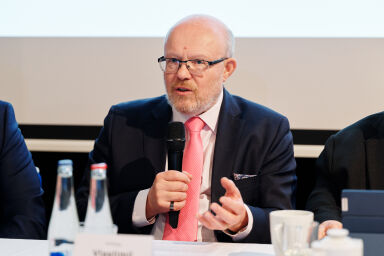The number of oncological patients continues to grow, and malignant tumours are being found in younger and younger patients. Many problems can be prevented by early detection within the system of national screening programmes but these are not self-redeeming. Therefore, primary prevention and regular check-ups by general practitioners, which can detect the first symptoms of the disease, are highly important. In the Czech Republic, oncological care is at a high standard and widely accessible; however, a psycho-social supportive environment and the interconnection of health and social care is lacking, President of the Czech Society for Oncology Jana Prausová declared at the international panel of the Permanent Conference on Czech Healthcare, held on the topic of the economics of prevention.
Every third person in the Czech Republic will fall ill with some type of malignant tumour, oncologists warn. Many problems can be prevented with early detection within the system of national screening programmes, but these are not self-redeeming, pointed out Jana Prausová, President of the Czech Society for Oncology and Head of the Department of Oncology, Second Medical Faculty of Charles University and Motol Faculty Hospital in Prague. “There are interval carcinomas that can grow even in the period between two mammograms. Let us not promise what we cannot fulfil,” she warned at the international panel of the Permanent Conference on Czech Healthcare, held on the topic of the economics of prevention.
Thus, she believes that regular check-ups by general practitioners play an irreplaceable role. Doctors know how to ask the right questions and recognise that their patient is not feeling well. They can discuss warning signs of cancerous diseases together. “Patients should know these signs by heart – changes in their weight, unstable body temperature, night sweating, skin changes, changes in bowel movement stereotypes, presence of blood where it should not be found, and what to do. Then, they come to their doctor with these inconspicuous changes in their behavioural habits and in what they are feeling,” she stated.

“Let us not promise what we cannot fulfil,” said Jana Prausová. On the left, Deputy Director, General Health Insurance Company, Ivan Duškov, on the right, President of Czech Society of Atherosclerosis Michal Vráblík. Photo: Radek Čepelák
According to her, this type of prevention is more important than, for example, blood tests looking for oncological markers as part of preventive check-ups. “It is necessary to realise that if no tumour is suspected at the moment patients leave their GP’s office, this need not be true in several minutes time. Therefore, any sort of symptom or irregularity is a reason for another visit to your doctor,” the oncologist pointed out.
The number of patients is on the rise
Each year, 85,000 people fall ill with malignant tumours in the Czech Republic, and the numbers continue to rise. In 2030, the prevalence is estimated at 750,000 people. Approximately 27,000 of them die because of these malignant tumours. Luckily, thanks to across-the-board screening programmes and high-quality and widely accessible oncological care, the death rate is growing at a much slower pace than the rate of new patients. Even so, malignant tumours remain the second-most-frequent cause of death, and according to estimates, could switch places with still dominant cardiovascular diseases to take first place by 2035.
Most often, oncologists treat patients in the age group of sixty to seventy years of age. However, this by no means indicates that younger people do not get tumours. “Colorectal carcinoma, breast carcinoma, carcinoma of the kidneys, or carcinoma of the prostate are easily found in people just over 40 years of age. Therefore, it is very important to talk about prevention,” Prausová explained.
In females, the most frequent diagnosed tumour is breast cancer, and with males, it is primarily prostate cancer. The next in line for both genders are colorectal cancer and lung and bronchial cancer. “In terms of mortality, the lungs are in the lead since we still do not completely know how to treat them. This will hopefully improve with the advent of innovative immunotherapy. The results of adjuvant therapy are promising,” Prausová added.
Mohlo by vás zajímat
There is also a gradual increase in melanomas and carcinomas of the prostate, the thyroid, and the oesophagus. On the contrary, cervical cancer cases have been decreasing. “Here, regular gynaecological check-ups probably played an important role, and I hope that the effects of HPV vaccinations are beginning to manifest. This is the best type of prevention – preventing something from even originating,” she added.

Even early detection might not help
“Today, we no longer dominantly classify tumours according to their size,” Prausová further explained. “Now we classify them according to their molecular-genetic and immunohistochemical classification, and to their degree of risk according to the character of their growth, development, and potential to metastasise. Let us thus not overestimate the fact that we can detect a tumour early. This need not be completely relevant on whether it will turn out well. Regarding the size of the tumour, even early stages can kill. The informed public must be aware and vigilant about this.”
At present in the Czech Republic, there are three across-the-board screenings to which health insurance companies personally invite their clients. According to Prausová, breast cancer screenings have an attendance of 60 percent of the targeted population, 30 percent attend colorectal cancer screenings, and 60 percent attend cervical cancer screenings. Still a lot remains to close the gap. At least, according to Prausová, the Covid-19 pandemic has yet to make a significant dent in these numbers, although some estimates thought it would substantially reduce the attendance of these programmes. “The decreased attendance rates were always short-term, and the numbers rapidly went back. We need not yet be worried, as to date we do not have any relevant data for it,” the oncologist placated the audience.

Starting next year, a new screening for lung cancer will also be carried out among smokers with twenty pack-years (1 pack-year = 20 cigarettes daily for a period of one year or 10 cigarettes daily for a period of two years, etc.). “Here, however, it is somewhat problematic, because one has to tell the truth about the extent of their smoking. And we cannot entirely depend on their truthfulness,” Prausová pointed out.
Oncological treatment is at a high standard but a psycho-social supportive environment is missing
As already mentioned, oncological treatment in the Czech Republic is at a very high standard and widely accessible. The two national oncological centres in Prague and Brno are complemented by a network of complex oncological centres located in all regions, except for the Karlovy Vary Region. “There is no one there to run it,” Prausová laconically explained, and she added: “We can construct the building but we cannot fill it with experts. They are all going west.” Prausová also believes that we also have big gaps in the psycho-social supportive environment for oncological patients. “Health and social care are not interconnected in our country, which is absolutely wrong in terms of chronic diseases,” the oncologist asserted.

Slovak Minister of Health Vladimír Lengvarský also talked at the international panel. Photo: Radek Čepelák
Prausová believes that patient care must be organised in the aforementioned centres: “Oncological treatment is holistic medicine. It has be linked to a larger hospital. We need all experts, such as cardiologists, diabetologists, eye or ORL doctors, and more, including emergency doctors and intensive care units. Only thus can we treat patients as they deserve to be treated and as their comorbidities require.” All depends on early diagnostics and multi-disciplinary teams. Therefore, they must be concentrated into the units of large university hospitals.
“Only then will oncology make sense, and I am insistent on this,” Prausová concluded; by which she indirectly opposed the argumentation behind the already adopted plan of Prime Minister Andrej Babiš to construct the Czech Oncology Institute. This is to be built in Prague on the premises of the Královské Vinohrady University Hospital at the area of an originally planned trauma centre. The Czech Society for Oncology has long been criticising this project which will cost seven billion crowns, financed by the National Recovery Plan.

Helena Sedláčková







